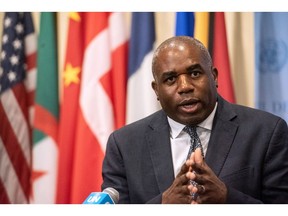
Article content
(Bloomberg) — Keir Starmer aimed to calm domestic criticism that he was failing to take a lead against the crisis in Gaza when he promised to recognize Palestine this week. Now, senior members of his UK government fret that he’s set the scene for more political pain next month.
THIS CONTENT IS RESERVED FOR SUBSCRIBERS ONLY
Subscribe now to read the latest news in your city and across Canada.
- Exclusive articles from Barbara Shecter, Joe O'Connor, Gabriel Friedman, and others.
- Daily content from Financial Times, the world's leading global business publication.
- Unlimited online access to read articles from Financial Post, National Post and 15 news sites across Canada with one account.
- National Post ePaper, an electronic replica of the print edition to view on any device, share and comment on.
- Daily puzzles, including the New York Times Crossword.
SUBSCRIBE TO UNLOCK MORE ARTICLES
Subscribe now to read the latest news in your city and across Canada.
- Exclusive articles from Barbara Shecter, Joe O'Connor, Gabriel Friedman and others.
- Daily content from Financial Times, the world's leading global business publication.
- Unlimited online access to read articles from Financial Post, National Post and 15 news sites across Canada with one account.
- National Post ePaper, an electronic replica of the print edition to view on any device, share and comment on.
- Daily puzzles, including the New York Times Crossword.
REGISTER / SIGN IN TO UNLOCK MORE ARTICLES
Create an account or sign in to continue with your reading experience.
- Access articles from across Canada with one account.
- Share your thoughts and join the conversation in the comments.
- Enjoy additional articles per month.
- Get email updates from your favourite authors.
THIS ARTICLE IS FREE TO READ REGISTER TO UNLOCK.
Create an account or sign in to continue with your reading experience.
- Access articles from across Canada with one account
- Share your thoughts and join the conversation in the comments
- Enjoy additional articles per month
- Get email updates from your favourite authors
Sign In or Create an Account
or
Article content
The British premier’s conditional pledge to recognize Palestinian statehood in September unless Israel agrees to end the conflict in Gaza sparked a backlash from both the left and right of the political spectrum, as well as accusations by the Israeli government, the White House and a British hostage who had been held captive by Hamas, that he risked rewarding terrorism.
Article content
Article content
Article content
Moreover, Starmer’s position was confused when he refused to give a clear answer on whether Palestinian statehood was also conditional on his long-held demand that Hamas release the remaining hostages held since its Oct. 7, 2023 attack on Israel. It was Business Secretary Jonathan Reynolds who eventually clarified that it was not, saying “we don’t put conditions on them because we don’t negotiate with terrorists.” That means Britain’s stated position differs from France and Canada’s by placing conditions on Israel but not Hamas.
Article content
By signing up you consent to receive the above newsletter from Postmedia Network Inc.
Article content
Senior UK advisers and officials — who requested anonymity speaking to Bloomberg about delicate internal discussions — are privately concerned that the unique stance exposes him to more political peril in September, when lawmakers return from their summer recess and he has to diplomatically balance hosting US President Donald Trump for an official state visit while making a final call on the recognition of Palestine. In his statement this week he said he’d do so “by” the United Nations General Assembly in late September — just days before facing Labour at the party’s annual conference.
Article content
Article content
One aide said if there still hadn’t been a ceasefire and the hostages remained captive, Starmer would either have to proceed to recognize Palestine, risking more intense criticism, or renege on his pledge, opening him up to a potential rebellion by his own Labour colleagues.
Article content
“This has put Labour in a very difficult position,” said Scarlett Maguire, founder and director of polling firm Merlin Strategy, citing the “tension between the pressure from Starmer’s left and his geopolitical strategy.”
Article content
Maguire pointed to the political threat posed by former Labour leader Jeremy Corbyn’s new party and a handful of independent candidates who took seats from Labour at last year’s election due to their pro-Gaza campaigns, a danger that’s likely to swell at local elections next year.
Article content
Starmer has ratcheted up criticism of Israeli military actions in Gaza and restrictions on the entry of humanitarian aid as media images of starving children proliferated in recent weeks. People in Britain, he said, were “revolted” by what they saw on their television screens.
Article content
The British premier made his decision on recognition last week, as the humanitarian crisis in Gaza worsened and pressure from his Cabinet and own MPs mounted, people familiar with the matter said. Senior advisers felt that having already suspended some arms sales and sanctioned senior Israeli ministers, there weren’t many more levers left to push Israel into alleviating the crisis.

.jpg) 11 hours ago
1
11 hours ago
1
 English (US)
English (US)